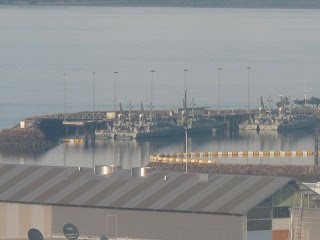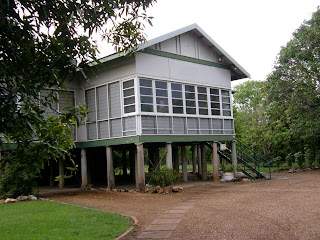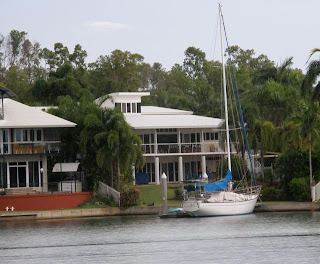More on Darwin
Darwin has at least a couple of tragic events on record from the 20th century. There may be more, I was there for a short time and didn’t get anywhere near the full history, with nothing at all from the pre-European era when the area was home for the Larrakia people.
Darwin is the smallest state capital in Australia with a population just topping 120,000. The first European settlement was established in 1869, so is less than 150 years old at the time of writing. The name came from a former shipmate of HMS Beagle’s captain Wickham – the now renowned naturalist Charles Darwin.
Its location at the top end of a very large continent is significant for a couple of reasons. Darwin is on the Timor Sea, closer to Indonesia and East Timor than to other Australian cities. Hence it was used as the jump off point for peacekeeping troops going to East Timor. I may find it hard to picture those tranquil streets of Irish pubs and tourist shops as freeways carrying army tanks and anti-aircraft guns, but residents witnessed this as recently as 2006. A few other remnants remain.


It seems East Timor’s struggle for independence from Indonesia that started in 1975 and passed a milestone in 1999 has yet to reach a final settlement.
In WWII, Japan’s assault on Australia began with an air raid on Darwin in February 1942. A further sixty-one raids on the Northern Territories and northern parts of Western Australia followed accounting for the majority of 100 Japanese attacks that lasted until November 1943.
There is a ‘common myth’ that Prime Minister John Curtin was ready to leave the northern half of Australia undefended and thus presumably open to Japanese occupation. Although bona fide researchers have since debunked it, the story remains the same. How different life could have been!
There have been a few more ‘assaults’– to use that term broadly - on Darwin since the end of the war. Cyclone Tracy flattened the city on Christmas eve and Christmas day in 1974. The net result is a very modern city with very few early settler buildings left as evidence of the previous century and a half. This is the only one I saw on an otherwise modern and pretty affluent landscape.




Government House built in the 1870s managed to escape the ravages of war and weather, and is now co-located with other grand buildings housing a state library among other things, with all mod cons, including efficient air-con, which is a frequent, necessary and welcome escape from the 43C heat of the day.

The excellent local museum displays an eclectic collection of traditional sailing and rowing craft from the surrounding tropical seas. Some have been confiscated in customs operations, others seized after asylum seekers commonly referred to as ‘boat people’ have been picked up in northern Australian waters. The stories can be complex, as the incident of the MV Tampa illustrates. There are likely to be many of these small craft that never reached their intended destination. The collection in Darwin museum includes what may be the last remaining examples of some historic designs.


Another wee treat came when I followed my ears up the stairs to a bar with live blues playing on a Sunday afternoon. The atmosphere was casual – extremely so. A table full of kiwis – easily identified by tats and greenstone adornments - supported their mate on guitar – of which there were no less than 5 in the band! A great wee interlude in a very atmospheric pub, from which just one burning question remains – who told the singer it is ok to dress like this on stage?


As a place for the budget or the reasonably affluent tourist, Darwin is hospitable, interesting and quite a bit exotic. Its a jump off point for boat and land tours to Kakadu, Katherine Gorge, Litchfield National Park, Arnhemland and other areas which are mainly accessible in the dry season (April – September). It’s rather quiet (and extremely hot) in the build up to the monsoon season (October – March). Don’t bother packing sweaters at any time of year. Expect limited tour options, good deals on accommodation and spectacular thunderstorms in the wet.
Darwin is the smallest state capital in Australia with a population just topping 120,000. The first European settlement was established in 1869, so is less than 150 years old at the time of writing. The name came from a former shipmate of HMS Beagle’s captain Wickham – the now renowned naturalist Charles Darwin.
Its location at the top end of a very large continent is significant for a couple of reasons. Darwin is on the Timor Sea, closer to Indonesia and East Timor than to other Australian cities. Hence it was used as the jump off point for peacekeeping troops going to East Timor. I may find it hard to picture those tranquil streets of Irish pubs and tourist shops as freeways carrying army tanks and anti-aircraft guns, but residents witnessed this as recently as 2006. A few other remnants remain.


It seems East Timor’s struggle for independence from Indonesia that started in 1975 and passed a milestone in 1999 has yet to reach a final settlement.
In WWII, Japan’s assault on Australia began with an air raid on Darwin in February 1942. A further sixty-one raids on the Northern Territories and northern parts of Western Australia followed accounting for the majority of 100 Japanese attacks that lasted until November 1943.
There is a ‘common myth’ that Prime Minister John Curtin was ready to leave the northern half of Australia undefended and thus presumably open to Japanese occupation. Although bona fide researchers have since debunked it, the story remains the same. How different life could have been!
There have been a few more ‘assaults’– to use that term broadly - on Darwin since the end of the war. Cyclone Tracy flattened the city on Christmas eve and Christmas day in 1974. The net result is a very modern city with very few early settler buildings left as evidence of the previous century and a half. This is the only one I saw on an otherwise modern and pretty affluent landscape.




Government House built in the 1870s managed to escape the ravages of war and weather, and is now co-located with other grand buildings housing a state library among other things, with all mod cons, including efficient air-con, which is a frequent, necessary and welcome escape from the 43C heat of the day.

The excellent local museum displays an eclectic collection of traditional sailing and rowing craft from the surrounding tropical seas. Some have been confiscated in customs operations, others seized after asylum seekers commonly referred to as ‘boat people’ have been picked up in northern Australian waters. The stories can be complex, as the incident of the MV Tampa illustrates. There are likely to be many of these small craft that never reached their intended destination. The collection in Darwin museum includes what may be the last remaining examples of some historic designs.


Another wee treat came when I followed my ears up the stairs to a bar with live blues playing on a Sunday afternoon. The atmosphere was casual – extremely so. A table full of kiwis – easily identified by tats and greenstone adornments - supported their mate on guitar – of which there were no less than 5 in the band! A great wee interlude in a very atmospheric pub, from which just one burning question remains – who told the singer it is ok to dress like this on stage?


As a place for the budget or the reasonably affluent tourist, Darwin is hospitable, interesting and quite a bit exotic. Its a jump off point for boat and land tours to Kakadu, Katherine Gorge, Litchfield National Park, Arnhemland and other areas which are mainly accessible in the dry season (April – September). It’s rather quiet (and extremely hot) in the build up to the monsoon season (October – March). Don’t bother packing sweaters at any time of year. Expect limited tour options, good deals on accommodation and spectacular thunderstorms in the wet.

0 Comments:
Post a Comment
Subscribe to Post Comments [Atom]
<< Home